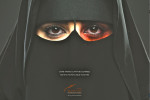The election of the so-called ‘moderate Islamist’ party, Ennahda, to the head seat of the government, has put Tunisia at the center of the discussion on the rise of Islamist post-Arab Spring. Media coverage has focused primarily on the alleged ‘inevitable’ imposition of the headscarf on all women and the possibility of great setbacks to the gains made by Tunisian women.
Woman wearing a Tunisian flag. Image via Truthout.
There has been little, if any, actual engagement with the evolving positions and campaigns of the party, as substantial or superficial as they may be, and even less engagement with the history of Islamic feminist movements in Tunisia (with the exception of a handful). In effect, much of the media engagement with the victory of an Islamist party in Tunisia has focused on a category of women’s rights as defined within the terms of secularism à la French laïcité, often at the expense of ‘visibly’ Muslim women (and some men). Unsurprisingly, this is part and parcel of the general approach taken to the role of Islam in the regional upheavals.
Yet, as previously mentioned, recent political gains by Islamist parties, particularly in Egypt, Libya and Tunisia, have caused concern for many both in the countries and beyond. Many, within the media and outside of it, have continued spouting the long-standing trope of what democracy could possibly mean for the Arab world: an anti-Western Islamist takeover leading to theocratic oppressive regimes.
The election of the Ennahda party in Tunisia, the announcement of Shari’ah law as the main source of law for Libya by the National Transitional Council’s leader, and the possibility of a Muslim Brotherhood victory in Egypt have raised considerable eyebrows as to what this could mean, in particular, for Muslim women in these states. While the Muslim Brotherhood victory in Egypt remains to be seen, as does the form Libya’s Shari’ah will take, Tunisia’s newly elected ‘Islamist’ government has garnered much attention, given the country’s long-standing pride in its advancements for women’s rights.
Ennahda, or The Renaissance Party, is Tunisia’s longest standing Islamist party and was banned under Ben Ali. The party was only legalized on March 1st of this past year, following the Tunisian revolution, which also led to the legalization of several other outlawed political parties. While not incredibly popular, Ennahda won the elections with 44.5% of the vote. The campaign against the ‘Islamist’ party has painted it as almost medievalist, bent on specifically reducing the advancements made by Tunisian women. Unsurprisingly, very few media excursions into the discussion and topic have explored the positions and political history of Ennahda, as well as those who helped it gain its victory. Rather, there has been much emphasis on concerns of anti-Ennahda Tunisians, which includes feminist organizations, secular women and leftists – many whom represent particular socio-economic backgrounds, an aspect that is rarely discussed.
It remains to be seen what role Islam will play in the new Tunisian government after having been on the fringe of the public sphere for decades. Despite its many claims to the contrary, will the new government, led by Rachid Ghannouchi, force all Tunisian women to wear the headscarf? Will the ban on polygamy and unilateral divorce be raised? These are amongst the many concerns that anti-Ennahda Tunisians have. Yet despite the legitimacy of these concerns, the concerns of those who have supported Ennahda, in lieu of the marginalization and at times repression of Islam in the public sphere, have been overwhelmingly ignored. In a piece for AJE Online, Yasmin Ryan insightfully discusses both sides of the Ennahda debate, pointing out that while fears of a harsh enforcement of Shari’ah exist amongst many Tunisians:
Other women, meanwhile, see in Al-Nahda the potential to gain new freedoms they have never had before.
Manel Sekmani, a 24-year-old who is studying for a masters in genetics in Tunis, says the most significant barrier to entering the workforce is discrimination against devoted Muslims such as herself.
Al-Nahda is the party, she says, that will challenge the prejudices encouraged by previous governments and allow women more, rather than less, liberty.
“Al-Nahda will protect women’s rights,” she says. “I was derided during the time of Ben Ali and I don’t want another government like that.”
These sentiments have also been echoed by a now-leading public voice of Ennahda, Souad Abel Rahim, a non-headscarf-clad woman (because this is apparently important for PR) who has been elected as the party’s candidate to the Tunisian Constituent Assembly. According to Abdel Rahim, it “may be that women from Ennahda are closer to Tunisian women than secular politicians.”
Thus, while the fear of many Tunisian feminists, secular women and leftists regarding an unprecedented infusion of religion into Tunisian governance and public sphere is legitimate, the converse equally applies. For as long as Tunisia has enjoyed what many proclaim to be ‘progressive’ women’s rights, it has also been at the expense of the free practice of religion, specifically that of many women who have been either legally or socially coerced in matters of faith and dress.
The future for women under the new Tunisian government, alongside that of women in neighbouring countries which are undergoing similar processes of the emergence of a political Islam in the seat of governance – needs far more critical engagement than what we have thus far seen in existing media. Tunisia`s example demonstrates that we cannot necessarily assume that Islamism can only lead to an oppressive proverbial harem for women (and even men) or that and secularism is the only route to achieve good. Instead it points starkly at the fact that Islamists, secularists, women and all those in between come in many different forms that cannot be reduced to to neat categories lacking in nuance.


